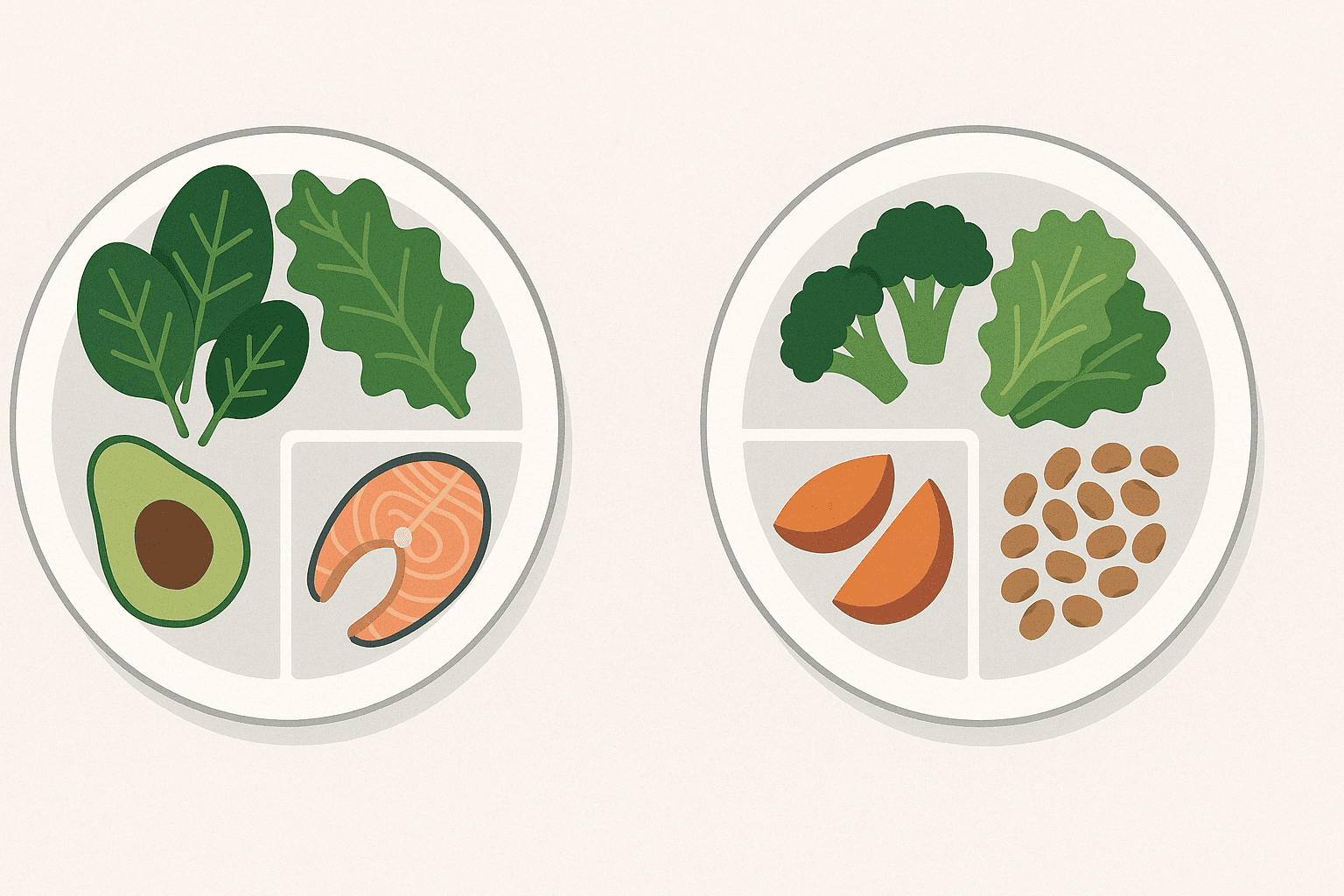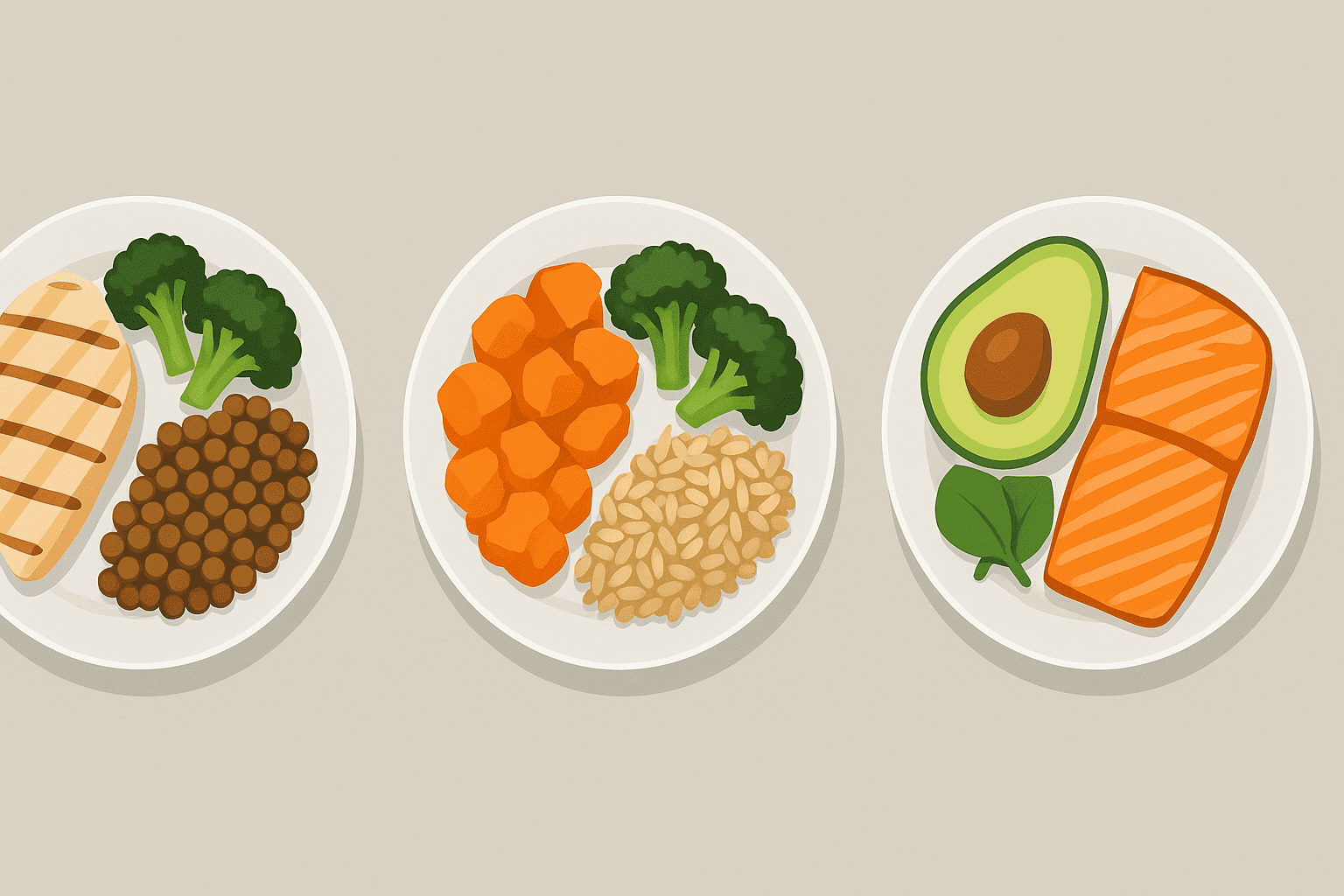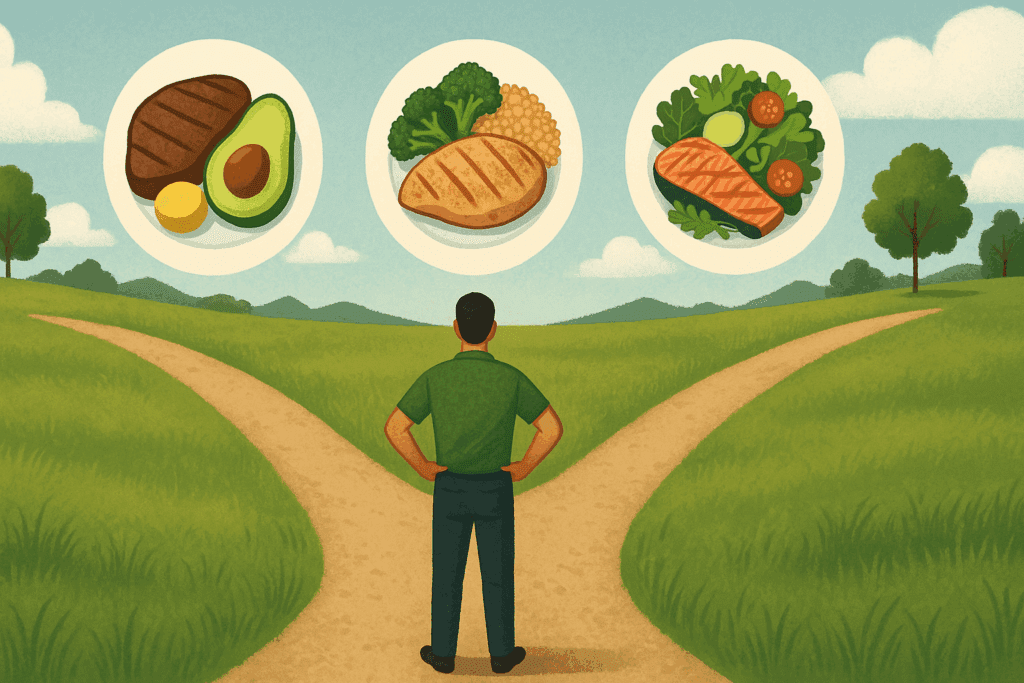Eating well and living strong isn’t a passing trend—it’s a lifelong pursuit of health, discipline, and energy. For many men, the path to optimal health begins in the kitchen, with a fork and a plan. “Meal prep for men” isn’t just about throwing grilled chicken into containers—it’s a strategic, sustainable lifestyle approach that empowers men to take ownership of their fitness, mental clarity, and long-term health goals. This comprehensive guide will unpack smart strategies that make meal prep approachable, enjoyable, and aligned with evidence-based nutrition, all while dispelling myths and answering common questions—like how the ketogenic diet compares to low-carb eating, or whether keto is a good, sustainable choice.
You may also like: Smart Meal Prep for Weight Loss: Expert-Approved Lunch Ideas and Recipes to Stay on Track
The Foundation of Meal Prep: Why It Matters for Men’s Health
Meal prepping isn’t about obsessing over every gram of protein or becoming a gourmet chef overnight. It’s about creating structure that simplifies nutrition decisions. For busy professionals, athletes, or anyone balancing multiple responsibilities, meal prep helps reduce decision fatigue, control caloric intake, and improve dietary consistency. Studies show that those who plan meals ahead of time tend to consume fewer ultra-processed foods and maintain healthier body weight. This is especially important for men, who often face unique challenges such as visceral fat accumulation and higher cardiovascular risk factors. By integrating meal prep into daily life, men not only reduce these risks but also build habits that promote longevity and mental resilience.
Smart meal prep for guys starts with understanding your personal goals—whether that’s muscle gain, fat loss, or maintenance—and tailoring meals accordingly. It also emphasizes nutrient timing, ensuring your body receives optimal fuel before and after workouts. Prepping balanced meals rich in whole foods—like lean proteins, complex carbs, and healthy fats—ensures men stay satiated and energized, with less reliance on quick fixes or sugary snacks.

Debunking the Confusion: Is Keto a Low Carb Diet?
One of the most common nutrition questions men face is: is keto a low carb diet, or is there a meaningful difference? While both limit carbohydrate intake, they operate with different physiological intentions. A low carb diet typically reduces carbs to about 50–150 grams per day, focusing on blood sugar stabilization and weight management. In contrast, the ketogenic diet drives carbohydrate intake down to 20–50 grams per day, pushing the body into a metabolic state called ketosis, where fat becomes the primary energy source.
Understanding the difference in metabolic outcomes helps clarify the debate: keto diet vs low carb diet. While both may aid in fat loss and metabolic improvement, keto is more restrictive and often harder to maintain. This is where sustainability enters the conversation: is a keto diet sustainable for the average man? It depends on individual lifestyle, discipline, and how well one’s body adapts to ketosis. For many, a moderate low carb diet offers similar benefits without the strict limitations of keto.
Building a Weekly Meal Prep Routine That Works
Creating a successful routine starts with simplicity. Begin by selecting a day—usually Sunday or a mid-week evening—for prepping three to four core meals. Choose versatile ingredients like brown rice, quinoa, chicken, sweet potatoes, beans, eggs, and vegetables that can be mixed and matched. Batch-cooking proteins and grains, washing and chopping veggies, and storing sauces separately enables effortless assembling throughout the week.
Smart meal prep for men isn’t about eating the same chicken and broccoli every day. It’s about building meals that satisfy and support your body’s evolving needs. For example, pre-workout meals might emphasize complex carbs and moderate protein for sustained energy, while post-workout dishes prioritize protein and anti-inflammatory nutrients to aid recovery. Prepping smoothies, overnight oats, or chia seed puddings can also simplify busy mornings without compromising nutrition.
It’s also vital to address food safety and shelf life. Cooked grains and proteins can safely last 3–4 days in the fridge, while frozen portions extend usability for up to a month. Investing in airtight containers, labeling meals, and organizing fridge space improves consistency and reduces waste.

Balancing Macronutrients for Energy and Muscle Growth
Macronutrient balance is the cornerstone of effective meal prep for men. Understanding how proteins, fats, and carbohydrates fuel the body enables more strategic choices. For men looking to build muscle, protein needs rise to approximately 1.6–2.2 grams per kilogram of body weight daily. High-quality sources like chicken breast, salmon, tofu, lentils, Greek yogurt, and eggs should take center stage.
Carbohydrates, often misunderstood, are essential—especially for active men. While keto and low carb approaches reduce or eliminate carbs, this isn’t always ideal for those with high training volumes. That’s why debates like ketogenic diet vs low carb must factor in physical activity. Complex carbs like oats, brown rice, and legumes offer sustained energy, support glycogen storage, and enhance performance.
Fats also play a critical role. Omega-3-rich foods like fatty fish, flaxseeds, and walnuts support cardiovascular health and hormonal function. Contrary to outdated myths, dietary fat doesn’t make you fat—excess calories do. Smart integration of all three macronutrients allows men to achieve strength and energy goals without compromising metabolic health.
How to Tailor Meal Prep for Weight Loss, Muscle Gain, or Maintenance
The same foundational ingredients can serve very different goals depending on portion size, nutrient ratios, and timing. For weight loss, men might emphasize higher protein, moderate fats, and reduced carbs—similar to a low carb approach. This setup supports satiety and preserves lean muscle during caloric deficits.
For muscle gain, larger portions and higher overall calories become necessary. Carbohydrates are especially crucial here, even if some advocate for low carb diet keto diet hybrids. The body needs glucose to maximize muscle recovery and growth. Increasing meal frequency—e.g., five smaller meals per day—can also support anabolic processes.
Maintenance requires finding a sustainable rhythm. This is often where the question arises again: is keto a good diet for long-term maintenance? While some thrive on the structure of ketosis, many find moderate carb inclusion more livable. The best meal prep approach for maintenance is flexible, includes a variety of whole foods, and aligns with long-term lifestyle habits rather than short-term aesthetics.

The Role of Fiber and Micronutrients in Men’s Nutrition
Often overshadowed by the macronutrient debate, fiber and micronutrients are essential pillars of health. Soluble and insoluble fibers from whole grains, fruits, vegetables, and legumes support digestive health, regulate blood sugar, and improve satiety. For men concerned with heart health or metabolic syndrome, fiber is particularly protective.
Micronutrients like zinc, magnesium, B-complex vitamins, and vitamin D are crucial for hormonal balance, energy metabolism, and immune function. Unfortunately, restrictive diets like strict keto can lead to deficiencies in these areas. While multivitamins can help, whole-food sources provide better bioavailability and synergistic benefits. A well-rounded meal prep routine ensures these nutrients are integrated naturally and consistently.
Is Keto No Carbs? Dispelling the Myths
A common misconception is that the ketogenic diet eliminates all carbohydrates. In reality, even strict keto allows for minimal carbs—primarily from non-starchy vegetables, seeds, and low-sugar fruits like berries. Thus, when discussing is keto no carbs, the accurate answer is no. The goal is not carb elimination but carb minimization to induce and sustain ketosis.
This distinction matters for men deciding between meal prep strategies. Ultra-low carb doesn’t mean nutrient-poor. Leafy greens, cruciferous vegetables, avocado, nuts, and fermented foods all fit within keto yet provide essential nutrients. The challenge lies in balance. Men must monitor fiber, electrolytes, and overall nutrient diversity to thrive on keto without risking fatigue, digestive issues, or micronutrient deficiencies.

Integrating Plant-Based Options for Flexibility and Nutritional Depth
Contrary to the stereotype that meal prep for guys means meat at every meal, plant-based proteins and meals can play a crucial role. Lentils, chickpeas, edamame, tempeh, quinoa, and seitan offer high protein with added fiber and phytonutrients. These options are especially valuable for men looking to lower cholesterol, manage inflammation, or diversify their diet.
Even for those following low carb or keto diets, plant-based additions are possible. Tofu, nuts, seeds, and low-starch vegetables align with both frameworks. Furthermore, understanding the differences between keto diet vs low carb diet helps identify which plant foods fit better in each context. While legumes are too carb-dense for strict keto, they’re perfect for moderate low carb approaches.
Combining animal and plant-based ingredients also enhances micronutrient intake, particularly for minerals like iron, calcium, and magnesium. Such balance supports both physical performance and long-term health outcomes—making meal prep more dynamic and inclusive.
Sustainability and Lifestyle Compatibility: Choosing the Right Plan
Ultimately, the question is not just is keto a good diet but whether it’s the right fit for your lifestyle, preferences, and goals. Sustainability is a core EEAT principle, rooted in evidence and trust. If a plan feels like punishment, it’s unlikely to be maintained. Instead, focus on strategies that align with your daily rhythm—whether that’s prep-heavy Sundays or quick assembly during the week.
Keto can be effective for rapid fat loss, but it demands strict compliance and ongoing monitoring. For many men, a moderate low carb approach provides similar benefits with greater food flexibility. The best diet is the one you can stick with while still enjoying life, socializing, and thriving physically and mentally.
Meal prep empowers men to reclaim control over their nutrition in a chaotic food environment. Whether aiming to drop fat, build muscle, or maintain, having a plan that aligns with your real life is more important than following any trend.

Frequently Asked Questions: Meal Prep for Men Made Easy
What are some advanced time-saving techniques for meal prep for men with demanding schedules?
For busy men managing high-stress jobs or frequent travel, time efficiency is everything. Advanced techniques like investing in a sous vide machine or slow cooker can allow batch cooking with minimal oversight. Consider preparing two versatile base sauces per week—such as a tahini-lemon or chimichurri—that can instantly transform basic proteins into unique meals. For those who prefer variety, freezing pre-portioned smoothie bags with fruits, greens, and protein powder eliminates daily prep and ensures nutrient-dense breakfasts. These methods elevate meal prep for men beyond the basics, allowing even the most overscheduled professionals to stay consistent without sacrificing flavor or health goals.
How can men adapt their meal prep when dealing with unpredictable work or gym schedules?
Flexibility is essential when routines change daily. One underutilized approach is prepping deconstructed meals—keeping protein, carbs, fats, and vegetables stored separately for mix-and-match versatility. This method allows you to build meals on the fly while maintaining nutritional balance. Vacuum-sealed meals stored in the freezer provide a long shelf life and prevent food waste during surprise schedule shifts. Meal prep for guys who deal with last-minute meetings or irregular workouts should also include quick-cooking items like canned lentils, frozen stir-fry veggies, and pre-cooked grains. These hacks keep you nourished without needing to rely on takeout.
Can meal prep for men include social or family components to encourage long-term consistency?
Absolutely. Involving friends, partners, or kids in meal planning can turn a solitary chore into a social ritual. For instance, hosting a bi-weekly “meal prep Sunday” with a workout buddy helps build accountability and reinforces healthy habits. Teaching kids how to prep simple meals also encourages nutrition literacy while creating shared moments. These social elements bring emotional richness to meal prep for men, making it a lifestyle rather than a temporary goal. Moreover, collaborating on menus ensures variety and introduces cultural diversity to your food routine.
What psychological benefits are associated with consistent meal prep for guys?
Beyond physical health, meal prep offers emotional and psychological stability. Knowing that meals are ready reduces daily decision fatigue and enhances feelings of control. Meal prep for guys can also foster discipline that carries over into other life domains, such as financial planning and fitness. Moreover, consistently nourishing the body with whole foods supports cognitive clarity and mood regulation. This holistic sense of well-being is why meal prep is not merely about aesthetics—it’s an essential pillar of mental resilience and personal empowerment.
How can meal prep for men evolve with age and changing health goals?
As men age, metabolic rates slow, recovery needs increase, and hormonal shifts alter nutritional requirements. Smart meal prep strategies adapt by increasing anti-inflammatory foods like turmeric, berries, and omega-3s, and by focusing on high-fiber options to support gut health. For older men, calcium and vitamin D become essential, so prepped meals may shift toward fortified dairy or plant-based alternatives. Those over 50 may benefit from smaller, more frequent meals to stabilize energy and preserve lean muscle. This dynamic evolution makes meal prep for men a lifelong, adaptable tool for maintaining health across the decades.
What role does culinary creativity play in sustainable meal prep for men?
Routine doesn’t have to mean boring. Culinary creativity keeps meal prep sustainable and prevents palate fatigue. Try rotating spice blends—such as garam masala one week and za’atar the next—to reinvent the same ingredients. Explore lesser-known grains like farro or amaranth for new textures and nutrient profiles. Meal prep for guys who enjoy global flavors can include Korean bibimbap bowls one week and Mediterranean wraps the next. This creative experimentation makes meal prep more enjoyable, increasing long-term adherence without compromising nutritional goals.
How can meal prep for men support specific fitness goals like endurance or HIIT training?
Nutrient timing becomes especially important for men pursuing performance-specific fitness routines. For endurance athletes, prepped meals should prioritize glycogen restoration with complex carbohydrates like sweet potatoes or whole grain pasta. Those doing HIIT training may benefit from slightly higher protein and antioxidant-rich vegetables to manage inflammation. Including adaptogens like ashwagandha or maca in smoothies can also enhance recovery. Meal prep for men aiming to optimize performance must be goal-specific, considering both macronutrient composition and recovery-enhancing ingredients. This targeted approach ensures that nutrition supports—not hinders—progress.
Are there emerging technologies that make meal prep for guys more efficient and personalized?
Yes, the tech landscape is revolutionizing how we approach meal prep. Smart kitchen devices like app-connected air fryers or programmable pressure cookers streamline batch cooking. Nutritional tracking apps that sync with wearable fitness devices offer real-time adjustments to macro targets. There are even AI-powered grocery list generators that align shopping with fitness goals and pantry inventory. For tech-savvy individuals, these innovations make meal prep for guys more data-driven, personalized, and sustainable. The intersection of technology and nutrition is shaping the future of efficient, customized health solutions.
How do cultural and dietary preferences influence meal prep for men globally?
Meal prep transcends borders, and understanding cultural context enhances inclusivity and sustainability. In Mediterranean regions, prep often revolves around olive oil, legumes, and seasonal vegetables. In East Asian traditions, rice, seaweed, and fermented foods dominate the prep table. For Latin American men, beans, plantains, and spiced meats may serve as staples. By incorporating traditional ingredients and techniques, meal prep for men becomes more than functional—it becomes a celebration of heritage. This not only honors culinary traditions but also encourages compliance by aligning with personal taste and identity.
What strategies help maintain motivation for meal prep when enthusiasm declines?
Motivational dips are normal, but there are strategies to overcome them. Setting new short-term goals—such as trying five new recipes in a month—can reignite interest. Joining online communities or following inspiring food bloggers who specialize in meal prep for guys offers a sense of camaraderie and inspiration. Reframing meal prep as self-care rather than obligation can also shift mindset during low-motivation phases. Finally, reward systems—like treating yourself to a new kitchen gadget or dining out after a month of consistent prep—can reinforce positive behavior. The key is to make meal prep feel purposeful and dynamic, rather than monotonous or restrictive.

Conclusion: Redefining Meal Prep for a Healthier, Sustainable Future
Meal prep for men is more than a fitness trend—it’s a sustainable tool for building strength, confidence, and control over one’s health journey. With clear strategies, men can design plans that not only meet their goals but also evolve with their needs. Whether choosing keto, low carb, or a hybrid approach, what matters most is alignment with lifestyle, nutrient sufficiency, and long-term commitment.
Clarifying questions like is keto a low carb diet or comparing ketogenic diet vs low carb frameworks helps men make informed choices rooted in science—not hype. Meal prep for guys doesn’t have to mean rigidity or restriction. It can be a creative, empowering practice that brings structure and freedom to everyday eating.
From understanding how is keto no carbs is a myth, to exploring the nuances of is a keto diet sustainable, men can navigate the landscape of nutritional advice with confidence. Armed with knowledge, a bit of planning, and a commitment to well-being, meal prep becomes more than a habit—it becomes a lifestyle of strength, purpose, and vitality.
Further Reading:
How to Meal Prep for Muscle Gain

